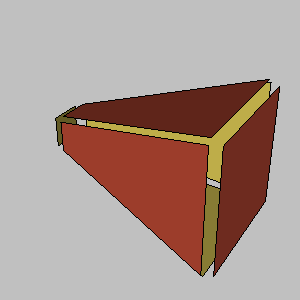Frustum
Repository source: Frustum
Description¶
This example gets the frustum from a camera and displays it on the screen.
Other languages
See (Python), (PythonicAPI), (Java), (CSharp)
Question
If you have a question about this example, please use the VTK Discourse Forum
Code¶
Frustum.cxx
#include <vtkActor.h>
#include <vtkCamera.h>
#include <vtkFrustumSource.h>
#include <vtkNamedColors.h>
#include <vtkNew.h>
#include <vtkPlanes.h>
#include <vtkPolyData.h>
#include <vtkPolyDataMapper.h>
#include <vtkProperty.h>
#include <vtkRenderWindow.h>
#include <vtkRenderWindowInteractor.h>
#include <vtkRenderer.h>
#include <vtkShrinkPolyData.h>
int main(int, char*[])
{
vtkNew<vtkNamedColors> colors;
vtkNew<vtkCamera> camera;
camera->SetClippingRange(.1, .4);
double planesArray[24];
camera->GetFrustumPlanes(1.0, planesArray);
vtkNew<vtkPlanes> planes;
planes->SetFrustumPlanes(planesArray);
vtkNew<vtkFrustumSource> frustumSource;
frustumSource->ShowLinesOff();
frustumSource->SetPlanes(planes);
vtkNew<vtkShrinkPolyData> shrink;
shrink->SetInputConnection(frustumSource->GetOutputPort());
shrink->SetShrinkFactor(.9);
vtkNew<vtkPolyDataMapper> mapper;
mapper->SetInputConnection(shrink->GetOutputPort());
vtkNew<vtkProperty> back;
back->SetColor(colors->GetColor3d("Tomato").GetData());
vtkNew<vtkActor> actor;
actor->SetMapper(mapper);
actor->GetProperty()->EdgeVisibilityOn();
actor->GetProperty()->SetColor(colors->GetColor3d("Banana").GetData());
actor->SetBackfaceProperty(back);
// a renderer and render window
vtkNew<vtkRenderer> renderer;
vtkNew<vtkRenderWindow> renderWindow;
renderWindow->SetWindowName("Frustum");
renderWindow->AddRenderer(renderer);
// an interactor
vtkNew<vtkRenderWindowInteractor> renderWindowInteractor;
renderWindowInteractor->SetRenderWindow(renderWindow);
// add the actors to the scene
renderer->AddActor(actor);
renderer->SetBackground(colors->GetColor3d("Silver").GetData());
// Position the camera so that we can see the frustum
renderer->GetActiveCamera()->SetPosition(1, 0, 0);
renderer->GetActiveCamera()->SetFocalPoint(0, 0, 0);
renderer->GetActiveCamera()->SetViewUp(0, 1, 0);
renderer->GetActiveCamera()->Azimuth(30);
renderer->GetActiveCamera()->Elevation(30);
renderer->ResetCamera();
// render an image (lights and cameras are created automatically)
renderWindow->Render();
// begin mouse interaction
renderWindowInteractor->Start();
return EXIT_SUCCESS;
}
CMakeLists.txt¶
cmake_minimum_required(VERSION 3.12 FATAL_ERROR)
project(Frustum)
find_package(VTK COMPONENTS
CommonColor
CommonCore
CommonDataModel
FiltersGeneral
FiltersSources
InteractionStyle
RenderingContextOpenGL2
RenderingCore
RenderingFreeType
RenderingGL2PSOpenGL2
RenderingOpenGL2
)
if (NOT VTK_FOUND)
message(FATAL_ERROR "Frustum: Unable to find the VTK build folder.")
endif()
# Prevent a "command line is too long" failure in Windows.
set(CMAKE_NINJA_FORCE_RESPONSE_FILE "ON" CACHE BOOL "Force Ninja to use response files.")
add_executable(Frustum MACOSX_BUNDLE Frustum.cxx )
target_link_libraries(Frustum PRIVATE ${VTK_LIBRARIES}
)
# vtk_module_autoinit is needed
vtk_module_autoinit(
TARGETS Frustum
MODULES ${VTK_LIBRARIES}
)
Download and Build Frustum¶
Click here to download Frustum and its CMakeLists.txt file. Once the tarball Frustum.tar has been downloaded and extracted,
cd Frustum/build
If VTK is installed:
cmake ..
If VTK is not installed but compiled on your system, you will need to specify the path to your VTK build:
cmake -DVTK_DIR:PATH=/home/me/vtk_build ..
Build the project:
make
and run it:
./Frustum
WINDOWS USERS
Be sure to add the VTK bin directory to your path. This will resolve the VTK dll's at run time.
